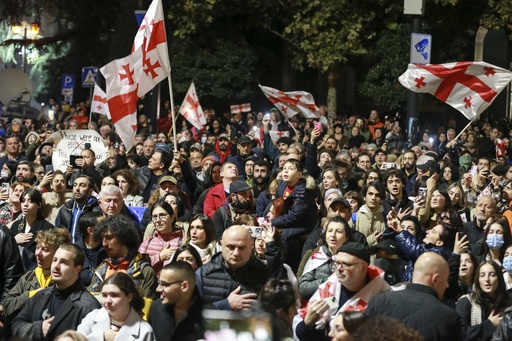
TBILISI, Georgia — The ruling party in Georgia is currently under significant pressure as widespread protests erupt, demanding the cancellation of its recent parliamentary election victory. Accusations of vote tampering, allegedly influenced by Russia, have fueled these demonstrations. In the backdrop of these events, the arrival of Hungary’s Prime Minister Viktor Orbán has introduced a new layer of complexity to the political landscape.
Orbán, the first foreign leader to commend the Georgian Dream party following their electoral win, made his visit to Georgia this week. His presence comes at a time when his relationship with the European Union is increasingly strained, as the EU insisted he traveled without approval from the bloc.
On Monday evening, crowds of Georgian citizens took to the streets outside the parliament building, insisting on holding a fresh election under international supervision, alongside calls for a thorough investigation into the alleged electoral fraud. This display of dissent reveals the heightened tensions in a country strategically located between Russia and Turkey, where the governing Georgian Dream party has garnered a reputation for authoritarianism and a noticeable alignment with Moscow.
President Salome Zourabichvili has spoken out against the official election results, stating that Georgia is experiencing the consequences of Russian interference aimed at obstructing its EU integration. She expressed her hope for support from the United States and the EU for the ongoing protests. “We’ve seen that Russian propaganda was directly used,” Zourabichvili commented, adding that the current administration has been “working hand-in-hand with Russia” and may have received assistance from Russian security agencies.
The Kremlin has dismissed these claims, while both the U.S. and the EU have called for a full investigation into the results of the parliamentary elections. According to the Central Election Commission, the Georgian Dream party secured 54.8% of the votes, with almost all ballots accounted for. Founded by Bidzina Ivanishvili, a reclusive billionaire with ties to Russia, the party has enacted laws that echo Kremlin policies targeting free speech and the rights of LGBTQ+ individuals.
U.S. authorities have urged Georgia to repeal these authoritarian measures, rectify electoral shortcomings, and steer the nation closer to European integration. In the wake of his party’s victory, Prime Minister Irakli Kobakhidze proclaimed their win as “impressive and obvious,” asserting that any discussions of electoral fraud are “doomed to failure.”
During his meeting with Orbán, Kobakhidze expressed gratitude for the Hungarian leader’s backing of Georgia’s EU aspirations, emphasizing shared values and goals between the two nations. In response, Orbán noted that the electoral results indicated that the Georgian populace “voted for peace,” suggesting that “no one wants to destroy their own country and plunge it into a senseless conflict.”
Orbán’s remarks seemed to resonate with the divisive campaign messages of Georgian Dream, which accused the opposition of attempting to undermine the nation amid fears stemming from the ongoing war in Ukraine. The Hungarian Prime Minister deemed the election free and democratic, countering assertions that Georgian Dream opposes EU integration as “really ridiculous.”
As a long-standing ally of Russian President Vladimir Putin within the EU, Orbán currently presides over the rotating presidency of the EU, often using this platform to highlight the bloc’s internal disagreements. Following the passage of a controversial “foreign influence law” in June, the EU has indefinitely suspended Georgia’s membership application process, deepening frustrations among the Georgian public regarding their EU ambitions.
The election campaign in Georgia, a nation of approximately 3.7 million people bordering Russia, was marred by intense competition and numerous allegations of smear tactics. European observers characterized the electoral atmosphere as “divisive,” with reports of intimidation, vote-buying, and physical violence. During the campaign, the Georgian Dream party was accused of using “anti-Western” rhetoric and amplifying Russian misinformation, as noted by Antonio López-Istúriz White, leading the European Parliament’s monitoring delegation.
Instances of intimidation were especially evident in rural regions, while voter turnout reached levels not seen since the Georgian Dream party first secured parliamentary control in 2012. The party has committed to pursuing EU membership while simultaneously seeking to “reset” relations with Russia, a country that recognized the independence of two separatist regions after its brief war with Georgia in 2008, subsequently increasing its military presence in those areas.
